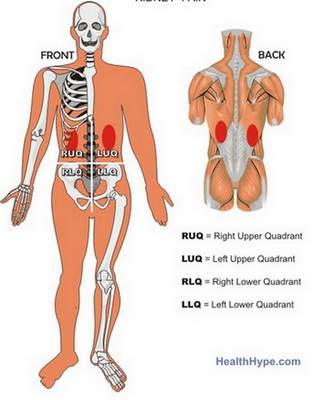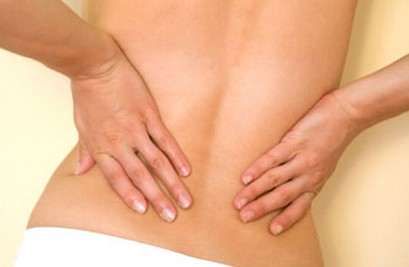Kidney Pain – Location, Symptoms, Causes, Diagnosis and Relief
Kidney Pain Location
Kidney stone pain is sometimes mistaken for pain that is coming from other organs. In order for you not to be confused, kidney pain is usually located isolated at the lower back. However, the pain felt digress from person to person. Persons who have kidney pain are most often associated with infection, kidney disease, injury or kidney stones. The pain felt by these people is located at the lower or mid back portion and radiates either to the sides, upper portion of the back and other areas of the person’s body.
Kidney pain is different from back pain because back pain are located predominantly at the back as a result of muscular, nervous, joint and bone problems. While in the kidney pain is a pain that is experienced at the lower back at the left and right side of the spine and above the hips or gluteus maximus.

Picture 1 – Kidney pain location (front & back side)

Kidney Pain Causes & Risk factors
When one experiences kidney pain, it may be because they are suffering from the following disorders:
Arteriosclerosis
When fats accrue in the walls of the artery, it leads to the disease called arteriosclerosis. It is when the arteries get blocked. When this happens, the blood supply is blocked and cut off leading to severe kidney pain.
Kidney Infection
It is also known as pyelonephritis. This infection greatly affects the urinary bladder and goes up all the way to the kidney. When that happens, the kidney tissues will swell leading to the person manifesting kidney pain. If not treated as soon as possible, it will lead to damage of the kidneys which will be permanent.
Urinary Tract Infection or UTI
This disease condition is common in women. It will affect generally the bladder yet will still spread to the kidneys. When the kidneys become affected, the person will manifest abdominal kidney pain.
Kidney Stones
When there is an imbalance in fluids and electrolytes, it will lead to crystallization because the urine will solidify. This solidification or crystallization is commonly known as kidney stones. When the kidney stones block the flow of the urine, it will make the person feel kidney pain. In addition, some person would report that the kidney pain would occur commonly at late night or in early in the morning.
Polycystic Kidney
This kind of kidney disorder is inherited. It causes the kidneys to hypertrophy or enlarge because there is a formation of several cysts. People who have this will lead to the manifestation of aching and dull kidney pain.
Kidney Cancer
This kind of disease condition occurs rarely. What happens is that a tumor grows and damages the kidney’s capsule leading to constant, dulling kidney pain.
The difference between the back pains from a kidney pains is that back pain’s etiology is due to injury of the back that is caused by mild sprain to severe condition such as slip disc and the like. In addition, back pain does not need any medical attention especially when its mild back pain unlike kidney pain.
Kidney Pain Symptoms & Signs
Persons having this kind of disease condition will manifest the following symptoms:
- Urinary problems such as blood in the urine or abnormal urine color
- Fatigue
- Painful menstruation period
- Joint Pain
- Nausea
- Dull and sometimes sharp kidney pain
- Vomiting
- Piercing and dull pain at upper back
- Swelling in either hands, face or feet
- Fever
- Weight loss
- Loss of Appetite
- Frequent, difficult and painful urination
- Foul and excessive urine
- High blood pressure
- Nail abnormalities
- Dribbling every after urination
- Sediment in the urine
- Decrease urine flow
- Pain, burning during or relieved upon urination
While when a person experiences back pain he or she manifest a continuous and dull pain that becomes worst upon movement.
Kidney Pain Diagnosis
In diagnosing and confirming if the person is really experiencing pain that is associated with the kidney organ, the physician will conduct the following diagnostic tests:
Intravenous Pylogram
It is a special x-ray examination that focuses only on the KUB or kidney, ureter and bladder. The physician will let the patient undergo this test for him to determine if there are any kidney stones, blockages or abnormalities that is the reason why the patient is experiencing pain.
Renal Arteriography
It is also called as renal angiography and it is known as a special x-ray diagnostic examination of the kidney’s blood vessels.
Urine Examination
It is a routine exam that will include the pH, WBC or white blood cells, and sugar. Here, the midstream urine is taken and given to the laboratory.
Ultrasonography
It is an ultrasound based diagnostic examination. It is done to visualize the body structures, in this kind, specifically the kidneys.
Blood Examination
It is done through the CBC or Complete Blood Count where in the physician requests this to be done in order to know the blood cellular information of the patient.
CT or Computerized Tomography Scan
It is actually a medical imaging that uses tomography which gives 2-D to 3-D images of a slice of an object. Hence, this is a preferred by some physician because of the accuracy it gives.
Kidney Pain Treatment
In treating a person who is experiencing kidney pain, the main treatment will greatly depend on the etiology and medical condition of the person having this kind of disease. Some modes of treatment can be done with disease condition includes:
Allopathic Treatment
It is a kind of treatment that treats the disease condition by suppressing the symptoms of illness. An example of allopathic treatment is surgery.
Homeopathic Treatment
Homeopathy is a popular holistic system of medicine. It is the opposite of allopathic treatment; it encourages the body’s reaction to an illness. It is a method of treating this disease by the use of drugs that produce similar symptoms of kidney pain. Its aim is to address the cause and susceptibility of the individual per se.
Other Alternative modes
Alternative methods in treating kidney pain include acupressure, acupuncture, yoga, ayurveda, naturopathy and the like.